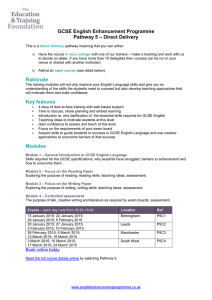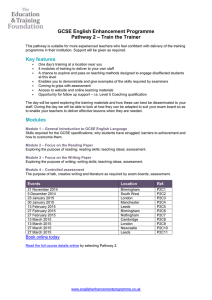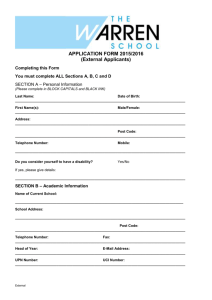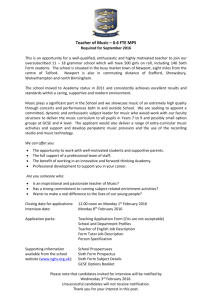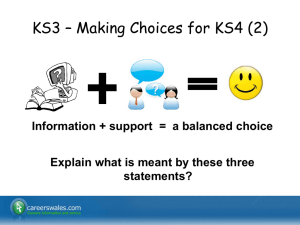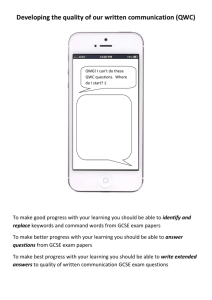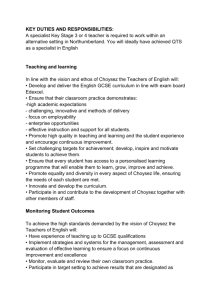Curriculum Policy Introduction Our students will experience a broad
advertisement
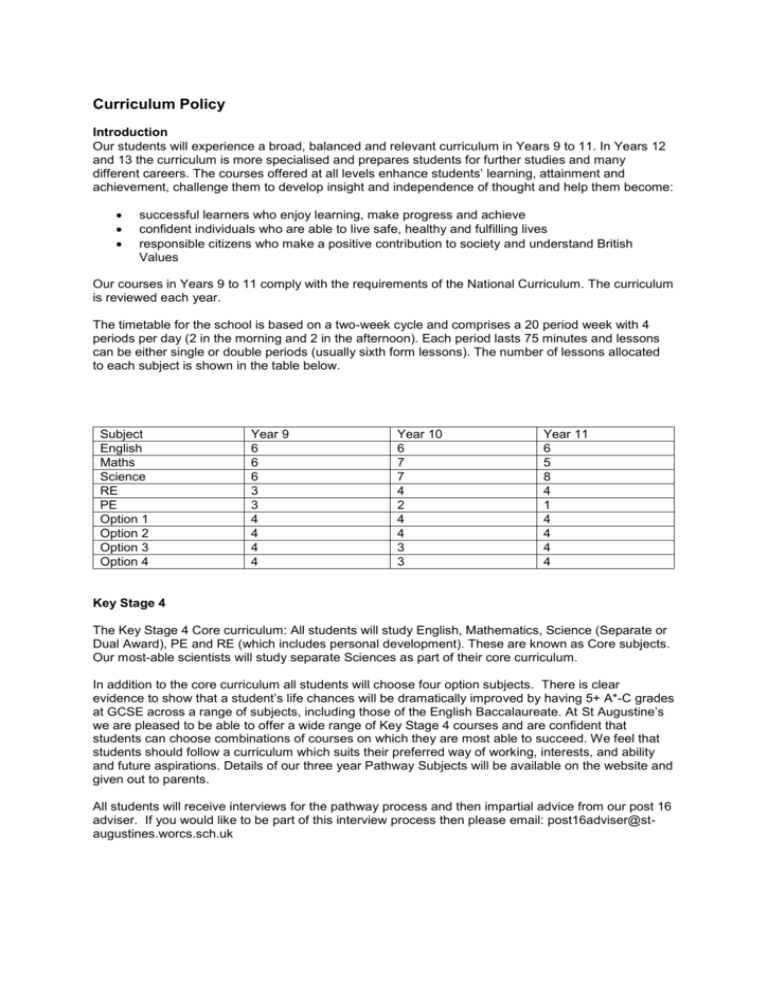
Curriculum Policy Introduction Our students will experience a broad, balanced and relevant curriculum in Years 9 to 11. In Years 12 and 13 the curriculum is more specialised and prepares students for further studies and many different careers. The courses offered at all levels enhance students’ learning, attainment and achievement, challenge them to develop insight and independence of thought and help them become: successful learners who enjoy learning, make progress and achieve confident individuals who are able to live safe, healthy and fulfilling lives responsible citizens who make a positive contribution to society and understand British Values Our courses in Years 9 to 11 comply with the requirements of the National Curriculum. The curriculum is reviewed each year. The timetable for the school is based on a two-week cycle and comprises a 20 period week with 4 periods per day (2 in the morning and 2 in the afternoon). Each period lasts 75 minutes and lessons can be either single or double periods (usually sixth form lessons). The number of lessons allocated to each subject is shown in the table below. Subject English Maths Science RE PE Option 1 Option 2 Option 3 Option 4 Year 9 6 6 6 3 3 4 4 4 4 Year 10 6 7 7 4 2 4 4 3 3 Year 11 6 5 8 4 1 4 4 4 4 Key Stage 4 The Key Stage 4 Core curriculum: All students will study English, Mathematics, Science (Separate or Dual Award), PE and RE (which includes personal development). These are known as Core subjects. Our most-able scientists will study separate Sciences as part of their core curriculum. In addition to the core curriculum all students will choose four option subjects. There is clear evidence to show that a student’s life chances will be dramatically improved by having 5+ A*-C grades at GCSE across a range of subjects, including those of the English Baccalaureate. At St Augustine’s we are pleased to be able to offer a wide range of Key Stage 4 courses and are confident that students can choose combinations of courses on which they are most able to succeed. We feel that students should follow a curriculum which suits their preferred way of working, interests, and ability and future aspirations. Details of our three year Pathway Subjects will be available on the website and given out to parents. All students will receive interviews for the pathway process and then impartial advice from our post 16 adviser. If you would like to be part of this interview process then please email: post16adviser@staugustines.worcs.sch.uk Key Stage 5 (Sixth Form) Important Notice: This information applies to the current Key Stage 5. The Department for Education has implemented major changes to A Levels and their assessment. We will publish our curriculum plan for Sept 2016 later in the year. We currently offer a wide range of courses at St Augustine’s and are confident that students can choose combinations of courses on which they are most able to succeed. We feel that students should follow a curriculum which suits their preferred way of working, interests, and ability and future aspirations. For full details of the courses offered within the Sixth Form, please visit the ‘Sixth Form’ link on our website Within the Study Programme, students will Be expected to take a variety of enrichment opportunities, which will include Work Experience and community enrichment activities (e.g. we work in partnership with the AT&T Aspire program) Study General R.E which focuses on British Values, World religions and human rights. Students are entered for the NOCN diploma Study the OCR general studies course which covers aspects of maths, Science, Culture, Media, Ethics, Geography, History all of which are core areas for higher education Participate in a general sports program run on a Wednesday afternoon Early Entry St Augustine’s is committed to ensuring that all of our students are prepared for their examinations in the most effective way possible. This means that they should not be entered for examination until they are ready to achieve their full potential. Research from the Department of Education reveals that, statistically, students who are entered early for their GCSE exam will do less well than those entered after the full time (‘Early Entry to GCSE examinations’). When considering early entry to GCSE examinations, there are also other factors to consider: Dropping the subject part way through the year may lead to students losing interest in the subject and therefore becoming less likely to progress beyond GCSE. Early entry could lead to the programme of study being delivered over a compressed time period, which in turn could result in coaching to the test rather than delivery of a broad curriculum. Early entry also increases the number of retakes (to secure the required grade) which has additional cost implications. It is better to ensure pupils are adequately prepared for the exam first time round. In the vast majority of cases, students should sit the examination at the end of a two-year GCSE course. However, occasions will remain when early entry is the correct option for the student(s). Early Entry should only be considered: If it is in the best interests of the student If the student is likely to achieve the best possible grade After consultation with all parties, including students, parents/carers and SLT Link Managers Where there is a clear and progressive pathway for the student to continue studies in the subject should they require it
